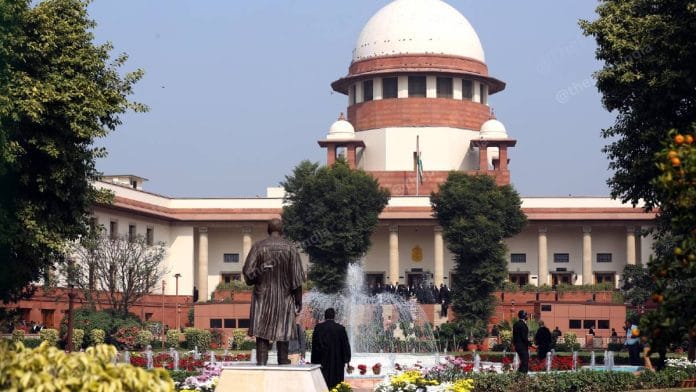New Delhi: The Supreme Court Thursday reserved its order on interim pleas seeking a stay on its 11 August order which directed authorities to pick up stray dogs from the streets of Delhi-National Capital Region (NCR) and shift them to shelters.
The matter was heard by a three-judge bench of Justices Vikram Nath, Sandeep Mehta, and N.V.Anjaria.
Shortly before the hearing ended, the top court also warned those who filed intervention applications, saying that they would have to take up the responsibility and file affidavits providing evidence to support their claims.
“Parliament has framed rules and laws but these are not being implemented. On the one hand, humans are suffering and on the other, the animal lovers are (as well). Have some responsibility. All those who have filed interventions have to file affidavits and give evidence,” the court said, reserving its order on the petitions seeking stay of the suo motu order issued 11 August.
The above-mentioned order had set an eight-week deadline for rounding up all strays and relocating them permanently to shelters. As there was a hue and cry, Chief Justice of India (CJI) B.R.Gavai referred the matter to a larger bench led by Justice Nath. On Thursday, the three-judge bench reserved its order, which means the decision would be revealed at a later date.
Appearing for the Delhi government, Solicitor General Tushar Mehta began by saying that there exists a vocal minority of dog lovers and a silent, suffering majority. “Children are dying,” he said, pointing out that although sterilisation was initially an option, it wasn’t enough to curb the stray dog “menace”.
Pointing to figures outlined by the World Health Organisation (WHO), Mehta said, most of the victims are the old and children under the age of 15 years. “36 percent of rabies cases in the world are in India. No one is saying dogs have to be separated, but children are being mutilated,” he said, adding that activism is now on the extreme.
Contentions placed
“This is the first time I have heard the Solicitor General of India say that there is a legislation in place, that is the Animal Birth Control (ABC) rules, but don’t comply with it,” said senior advocate Kapil Sibal, who appeared for NGO Project Kindness.
Underlining that the existing parliamentary legislation needs to be complied with, Sibal pointed to the callousness of the Municipal Corporation of Delhi (MCD) in the matter.
“What has the MCD done for so many years? They have money for sterilisation, but it gets siphoned. Now that the community is feeding them, you are saying take them out and cull them. You can’t pass an order like that,” Sibal said, urging the court to stay its 11 August order.
Sibal also informed the court that the 11 August order directed that sterilised and immunised stray dogs cannot be sent back. “Where will they go? This direction has to be stayed. All authorities are to begin picking up stray dogs. This directive has to be stayed, too.”
Dogs, he said, are all the more prone to attacking and injuring one another when they are holed up together in tiny shelters without adequate space.
“When there is not enough space, they attack and injure each other, causing pestilence, which can affect human beings too. Let the legislation take care of it. If there are concerns, your Lordship will take care of it.”
The senior advocate added that the authorities concerned do not immunise or sterilise the strays, leading to a situation where they multiply and the government blames the community.
Also appearing for the cause of stray dogs was senior advocate Abhishek Manu Singhvi. “With the best of intentions, these directions put the cart before the horse. If there was infrastructure, the situation would be different but we can’t even accommodate them,” he contended.
Underlining that everyone is concerned about the welfare of the elderly and the young, Singhvi said that the bench will be surprised to know that parliamentary answers from this year have revealed that there are zero rabies deaths. “This does not mean that dog bites are not bad, but to create a situation of a dog menace is not correct.”
Instead, the ABC rules can be strictly implemented and the dogs can be sterilised in a humane manner, rather than being picked up overnight, he asserted.
Senior advocate Colin Gonsalves, meanwhile, said that in Gurugram, the stray dog population has come down to 16 percent by vaccination. “Even in Nizamuddin East, this number has reduced. 10 years down, Delhi will be rid of stray dogs completely,” he said.
(Edited by Tony Rai)
Also Read: How Delhi is mobilising to save its street dogs — shelters, safe houses, and watch patrols






